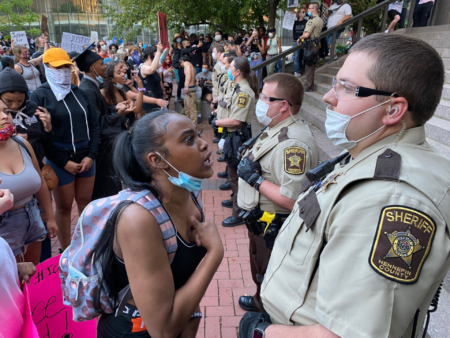Over the weekend, protests over the death of George Floyd rolled across the country from Miami to Los Angeles, from Washington, D.C. to Minneapolis, from Atlanta to Seattle.
An unarmed, pinned down and handcuffed Floyd was murdered on Memorial Day after Derek Chauvin, a white Minneapolis police officer, pressed his knee into Floyd’s neck for nearly eight minutes while three other police officers stood by without offering assistance. Almost 10 minutes of the assault and murder were caught on video by a teenaged bystander.
The four officers were fired the day after Floyd’s murder, but charges weren’t filed right away (as of May 31, only Chauvin has been charged in Floyd’s murder), leading to days of large protests across the United States and other countries. Though this is just the latest such death in a series of black men and women at the hands of police, it is the first one that sparked protests in the middle of a public health pandemic.
News media has captured images for the last six days of protesters packed shoulder to shoulder onto city streets. Some are wearing masks, but many aren’t. And though the crowds of participants have been diverse, black folks make up a significant number of protesters—as well as the majority of coronavirus cases and deaths in this country. Health experts fear silent carriers of the virus who have no symptoms could unwittingly infect others. This is especially troubling in a community that can ill afford more infections.
“Whether they’re fired up or not, that doesn’t prevent them from getting the virus,” Bradley Pollock, chairman of the Department of Public Health Sciences at the University of California, Davis, told the Associated Press.
As of Sunday night, the U.S. has registered almost 1.8 million infections and just shy of 105,000 deaths in the coronavirus pandemic, which has disproportionately affected racial minorities in a nation that does not have universal health care.
“We have two crises that are sandwiched on top of one other,” Minneapolis Mayor Jacob Frey said.
The Minnesota health commissioner agreed, warning the protests are almost certain to fuel new infections.
Cloth face masks, recommended by the Centers for Disease Control and Prevention to help slow the spread of coronavirus, don’t guarantee protection from the virus. Cloth masks keep infected people from spreading the virus, according to the CDC, but they are not designed to protect wearers from catching it. Coronavirus has a lengthy incubation period, with symptoms taking from 5 to 14 days to appear in an infected person. The spike health experts are concerned about may not show up for two to three weeks.






